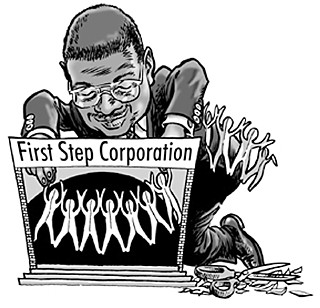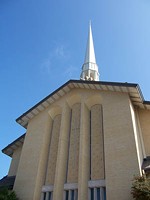Naked City
Council Watch: Cedar Fever
By Emily Pyle, Fri., Feb. 23, 2001

Council Watch: Cedar Fever
Six years and a day after the Valentine's Day clash between East Austin teenagers and police officers that will be known for posterity simply as "Cedar Avenue," the City Council shuffled a little closer to reconciliation. On Thursday, the council voted 6-1 to nominate seven individuals to the First Step Corporation, the nonprofit set up in 1998 to oversee the dispersal of the city's $710,000 out-of-court settlement with teenage plaintiffs.
Originally composed of seven church and community leaders, the First Step board atrophied to three a year later -- board chair Rev. George V. Clark of Mount Zion Baptist Church, Rev. Joseph Parker, and former Council Member Eric Mitchell. Mitchell finally called it quits last summer, and Parker left just before the end of the year.
The council vote to nominate new members was an odd gesture, however, considering the board was set up to operate free of further tinkering from City Hall. Awkward, too, given that seven names proposed for seven places doesn't seem to leave room for the one board member remaining.
The council stressed -- five times, in fact -- that the nominations were merely a suggestion, that Clark, now a majority of one, can do as he pleases about appointing new board members. He can even choose to modify the corporation's bylaws and expand the board to eight members. Still, Council Member Daryl Slusher was too uncomfortable with the motion to support it.
"I think [Parker] has done an admirable job in a very tough situation," Slusher said. "I'm uncomfortable removing him and expanding the size of the board as well."
Council Member Danny Thomas, who sponsored the motion, said after the vote that he was not asking specifically for Clark's resignation. But he did add that Clark could "see seven names coming to him on a seven-member committee and put two and two together."
Thomas leveled no charges specifically at Clark, but First Step has been plagued with controversy. Board members have abandoned it, and former litigants have complained steadily about its method of dispersing the settlement money. At a roof-raising council meeting last August, former plaintiff Candice Wade and several others complained of bureaucratic delays and lack of information from First Step.
The council voted 6-1 at that meeting (with only Slusher voting no) to send the Cedar Avenue settlement back into mediation, which is supposed to conclude this spring. If and when a new settlement does come back, First Step will still likely have responsibility for overseeing it. According to Thomas, the current board has been too dormant, and the council's suggested nominations are intended as a nudge, or perhaps a shove, in the right direction.
Five of the council's seven nominees are affiliated with Austin Community College, the University of Texas, and Huston-Tillotson College, and the hope is that plaintiffs will soon be applying their scholarship awards at those or other universities.
Towing the Line
In other action, the council hiked the price of car towing from traffic accidents and private property from $65 to a whopping $95, adding an additional $35 for tows that require a flat-bed truck. (Just when and why a flat-bed is required is apparently a topic of hot debate among Austin tow truck operators, but representatives from the Austin Police Dept. agree that a flat-bed is quicker and safer for towing large four-wheel drive vehicles.)
The fee hike might seem steep to the average double-parker, but towing companies claim it's barely enough to keep them in business, given the rising costs of fuel and equipment. Without the raise, said Southside Wrecker Service owner Don Digman, towing companies would lose money on the days they spend working for the city. "We have to go through traffic just like you do, so we're willing to work with anything we can," Digman told the council. "The only thing we've got to do is make a profit."
The higher fees will also go to fund programs that the city hopes will whittle down response time to highway accidents. The current average response time is about 47 minutes, which the city plans to shave down to 20-something minutes.
"This fee is not for towing per se," said Mayor Pro Tem Jackie Goodman. "It is for the program we are trying to initiate, which is to mitigate the congestions, especially on a highway at peak hours. And there may be a great many people who are willing to pay a little extra through this mechanism to make that happen."
Tow trucks will now be required to arrive at the scene of collisions within 45 minutes of being notified, and the chief of police will have authority to set response times and assign rush hour zones to tow trucks on the city's rotation list.
ARA OK
At Thomas' behest, the council also tossed some more money toward the Austin Revitalization Authority for infrastructure improvements along the East 11th Street corridor. It's been three years since the council passed a redevelopment plan for that area -- detailing East 11th Street as an "entertainment node" of shops and restaurants, and 12th Street as one of those live/work urban village things Smart Growth has made so popular -- but until last week it had never approved the money for new curbs and sewers. Thomas' item, which passed unanimously, will reimburse the ARA an estimated $600,000 for that work.
No council meeting this week, but next week's agenda includes enough controversial items for a month's worth of meetings. On the table: the Hyde Park Baptist Church garage, the proposed renaming of Rosewood Avenue for Dorothy Turner, and a proposed ordinance that would mandate street connectivity.
Got something to say on the subject? Send a letter to the editor.








